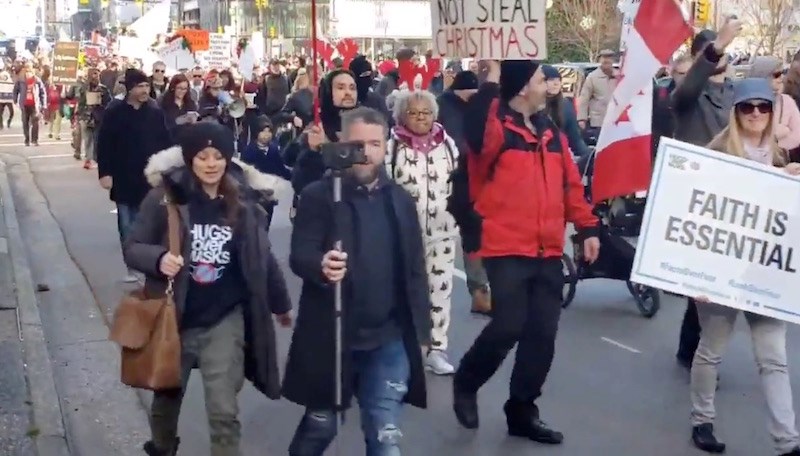With hundreds of anti-mask protestors descending on the Vancouver Art Gallery recently, one must wonder how this came to be. How can we address the movement's undeniable influence in Vancouver and the rest of North America?
Conspiracy theories surrounding coronavirus (COVID-19) started almost as soon as the virus began making waves in Asia and Europe. Nothing was off the table, anything from blaming 5G cell towers for the virus’ transmission to using Bill Gates as a scapegoat to saying the pandemic is manipulated by government puppet masters or arguing the virus isn’t real at all. The main gist of recent "anti-mask" rallies in B.C. was to call mask-wearing and social distancing ineffective ways of combating the virus, and that the numbers of deaths or infections have been falsely inflated.
Where does this rhetoric come from?
Edwin Hodge, a sociologist at the University of Victoria who studies far-right extremism, says conspiracy theories are born from any event that generates massive social change. This includes events like the assassination of a popular U.S. president, the September 11 terrorist attacks, or the 2008 stock market crash.
"In those times people's anxieties spike, people's fear spikes, Hodge said. “Sociologically it's a sense of dislocation. They get scared because the normal is gone and so they turn to anything that makes them feel like they have some sense of order or control."
Hodge emphasized people who believe this rhetoric are not inherently bad people, there is a spectrum. The actions of some conspiracy theorists have turned violent, hate-filled and racist. Spitting on people, smashing glass bottles into the faces of essential workers and the targeting of racial groups should be condemned without mercy he said.
On the other hand, there are non-violent people who are scared. The world doesn't make sense anymore to them and feelings of societal and government distrust have pushed them into a corner where everything can be answered by outlandish theories.
‘Their identity is now linked to this worldview’
“People who are deeply entrenched in conspiratorial ideology have committed to it,” Hodge said. “They've committed in the sense that a core component of their identity is now linked to this worldview. To attack the worldview is to attack that core of their identity.”
Hodge added that such believers act as many of us might if our worldview were questioned by a perfect stranger: by pushing back and doubling down on their beliefs, sending them further down the rabbit hole.
“Anger is certainly present but what I think is more present is righteousness. It's that translation of fear into a motive force. Into this feeling that not only are you right, not only are you being attacked but that you hold the truth and that you need to fight for it and stand in defense of the truth.”
Hodge explained that the sense of righteousness can become a sort of shield that can be the way they can combat what they think is happening to them. As a result, Hodge says, attacking them or their ideas is not helpful.
So what can we do about it?
David Black, a communications theorist at Victoria's Royal Roads University, says there are a few tricks to questioning these ideologies without sparking outrage in those who believe them.
The first is to do the exact opposite of what could be our knee-jerk reaction - to argue the facts of their position. Black says that by doing this you are playing directly into their hand as they now have all they need to deflect something that is empirically true.
"Once you do that you are arguing within their frame of reference and conspiracy theories are designed to refute contrary evidence," Black said.
Instead, Black suggests examining the way of thinking that got the person to their conclusion. This is not something that can be done via a Facebook comment or a Twitter thread Black warns, saying a high level of trust is needed to be formed in order to have that conversation.
"Once you have established that relationship of trust then you say 'let's talk about what this kind of thinking that you're indulging is about,” he said. "You kind of examine the designed features, you examine the systemology of conspiracy theory itself."
Talking with conspiracy theorists 101
In a presentation created by Black titled ‘You Won’t Believe What They Aren’t Telling You!’ he summarizes in two main do’s and don’ts regarding how best to speak with people who believe conspiracy theories during a global pandemic.
“Don’t argue with the premises of the conspiracy theory itself. Conspiracy theories are designed to defeat attempts to disprove them, and you will only deepen the person’s attachment to the theory. You will be considered part of the conspiracy.”
“Do talk with them about conspiracy theory in general, showing how they are built on logical fallacies, attach themselves to dubious cultural tropes… Show your family member or friend what it costs people when they believe in conspiracy theories.”



